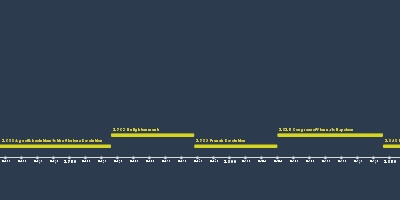1968 Cold War & Student Protests (1 janv. 1968 – 1 janv. 1989)
Description:
Unit 9:With financial assistance from the U.S., European states rebuilt after WWII
-Marshal Plan: =economic recovery, western accepted $$ but Eastern (USSR) did not
-Consumerism: more middle class, wages rose, televisions, automobiles (mostly in western states)
The Cold War centered around rivalry from the 2 nations who emerged most powerful from WWII: Soviet Union (communist) and the U.S. (democratic)
-Allied during war because of common enemy but after they held mistrust, and Russia wanted to spread communism, but U.S. wanted free elections
-Atomic bombs -> Hydrogen bombs arms race
-Couldn't fight each other because if one country attacked it would be catastrophic to whole world due to bombs
-Proxy wars: support other wars to fight against each other, local war, communist vs anti-communist
The 2 big players in the Cold War were the U.S. and the USSR, but their rivalry was felt in all European states to varying degrees, and throughout the world
-world monetary and trade systems
-NATO: military defense pact for western Europe from communists
-Warsaw Pact: Soviet's NATO for Eastern communist countries
Khrushchev: destalinization, less oppressive policies
-Hungarian Revolution: Hungary would leave Warsaw pact, Soviets send troops to Budapest and crush the revolution
Nationalist and Separatist movements, along with ethnic conflict and attempts at ethnic cleansing periodically disrupted the postwar peace
-attempts of ethnic cleansing: Yugoslavia borders drawn after WWI but did not consider rivalry ethnicities
-Tito: Yugoslavia's dictator
The postwar economic growth in western democracies brought with it a new means by which governments intervened in the lives of their citizens, specifically, increase in welfare benefits
-Cradle to Grave
The Soviet Union fell because of economic problems, reform efforts, and discontent in the Soviet Bloc
-Gorbachev: reform minded,
-Fall of Soviet Union in 1991
The role of women changed significantly over the course of the 20th century
-women's suffrage after WWI
-2nd wave feminist movement: fighting for social equality,
France: Simone de Bouvior: laid foundations "second sex" women should have opportunity and equal with men
The 20th century became the moment for the massive colonial empires created by European imperialism would begin to crack and ultimately fall apart
-Decolonization: negotiated independence: India, Ghandi, 1947 became independent, Armed conflict: Algeria, French colony, sent troops to crush rebellion but ultimately Charles de Gaulle recognizes independence
The formation and existence of the European Union influenced economic and political developments throughout the period following WWII to the present
-European Coal and Steel Union expanded into Common Market and then renamed EU: Single currency (Euro)
In the 20th and 21 centuries, globalization became more widespread, and the process happened at a much greater speed than it ever had before
-technology,
-Green parties and environmentalists
-Demographic Changes: family planning and education for women meant birth rate began to decline
Ajouté au bande de temps:
Date:
1 janv. 1968
1 janv. 1989
~ 21 years
